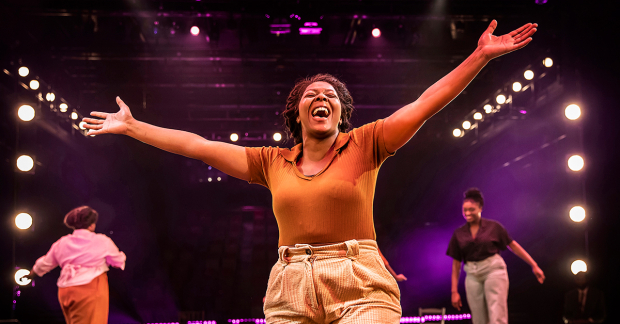Review: The Color Purple (Curve Leicester – online)
Tinuke Craig returns to Curve to oversee an online version of the hit musical

© Pamela Raith
Alice Walker's novel is a dark book to make a bright musical out of. It has a feel-good message about the power of sisterhood and love to pull a woman through, but its heroine Celie has to suffer incest, rape, and domestic abuse before making her way to her happy ending.
When Marsha Norman, Brenda Russell, Allee Willis and Stephen Bray turned the book into a hit Broadway show they inevitably sanitised its horrors. Although less saccharine than Steven Spielberg's movie, there's still something antiseptic about the world they created and the way it skirts over the true horror of the suffering experienced by black women in the American South between 1913 and 1945, brutalised by men who had themselves been fatally damaged by the legacy of slavery. The score's not much to write home about either; a couple of belting numbers aside, it feels more like a collection of fairly attractive fragments than a musical.
That said, this online concert version of the Leicester Curve's 2019 production, produced in cooperation with the Birmingham Hippodrome, has a lot to recommend it. For one thing, the need to make things simple in order to be both Covid-compliant and to get the show together in just ten days, means that director Tinuke Craig has stripped things back to their essentials which adds rather than subtracts from its impact.
The cast perform in costume on the Curve's revolve, surrounded not by scenery but by a bare auditorium, just glimpsed in the background. The filming has a few moments of arty framing and the occasional shot where a prop is in focus in the foreground, but on the whole it's a pretty straightforward capture of the action. The simplicity gives the show a directness, and immediacy that suits it well. But the approach also preserves Mark Smith's smart, snappy choreography and, under Alex Parker's musical direction, both the sound of a great band and some glorious harmonised singing from the ensemble.
It also focuses full attention on the performances from a cast (in the main, returning to their roles) who reveal a depth of understanding and commitment that illuminate the piece. As Celie, who moves from abused child to fully-realised woman, T'Shan Williams manages the difficult feat of making goodness believable. Her simplicity and tenderness as she endures the harshness of her life, her watchfulness as she weighs the action around her, and her final realisation of her own strength in "I'm Here", a statement of intent and empowerment, are all beautifully charted. The absolute knockout power of that song, is one of the many moments you miss the audience, who would surely have risen to their feet faced with a performance of such nuanced integrity.
A rare comic number between the battling Sofie (Karen Mavundukure) and her husband Harpo (Simon-Anthony Rhoden) where he chases her with his trousers around his legs would also bring the house down if there were one there. As it is, it feels slightly stranded and effortful, but the chorus of women who combine gospel and gossip make their brittle bitchiness break through the screen.
Women generally fare better than the men in this story of the liberating power of female solidarity even in a misogynistic world. Carly Mercedes Dyer brings just the right brightness and glamour to the character of Shug, who everybody loves; Danielle Fiamanya is sadly underused as Celie's beloved sister, but glorious every time she gets a chance to sing. The performances redeem the show, just as Celie's hope and persistence redeems the lives of those around her. Even they can't save the last half hour, which tails away badly, but it's an honourable effort nonetheless.












